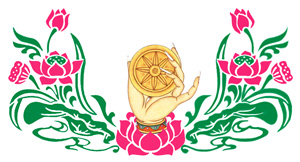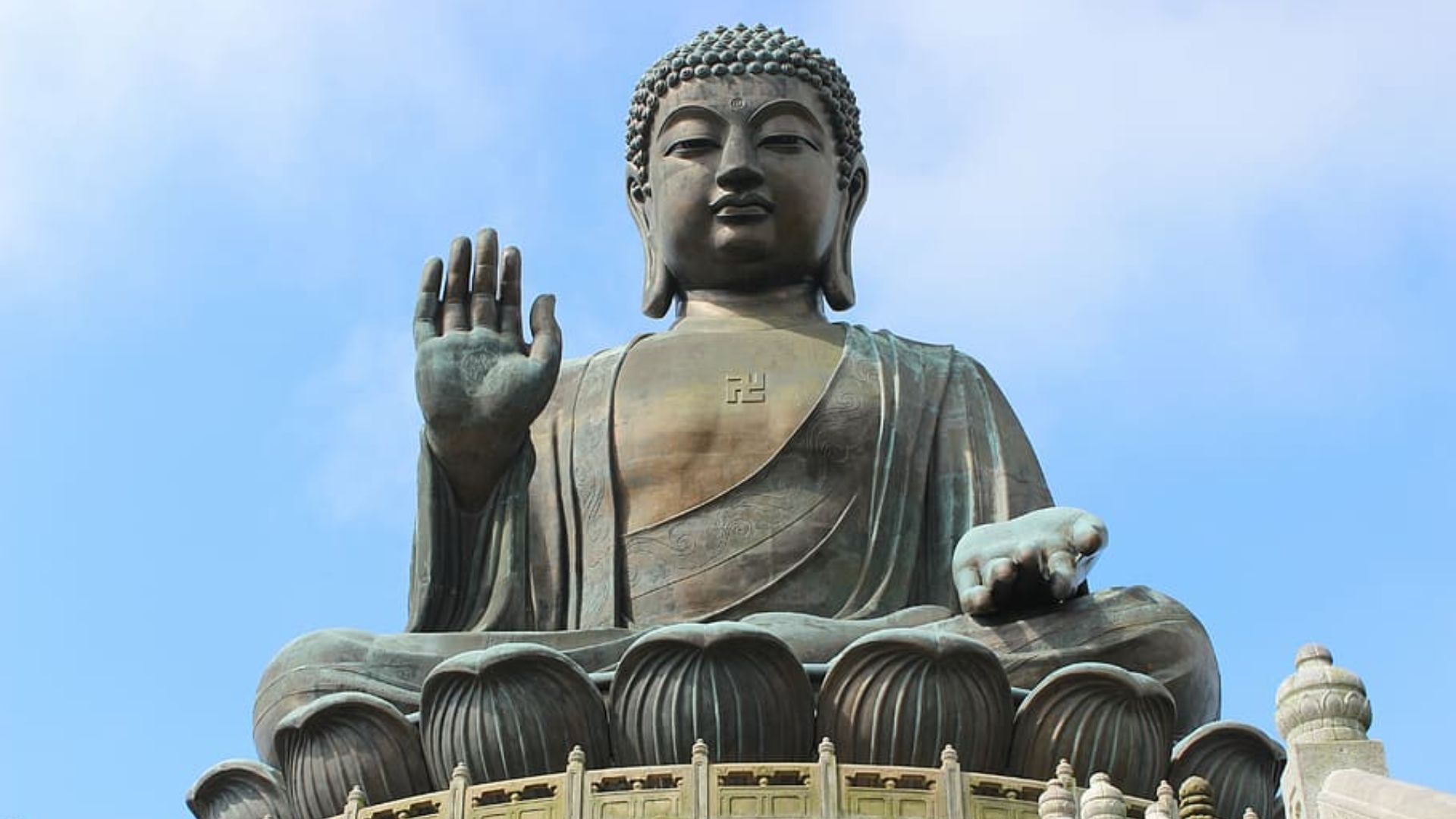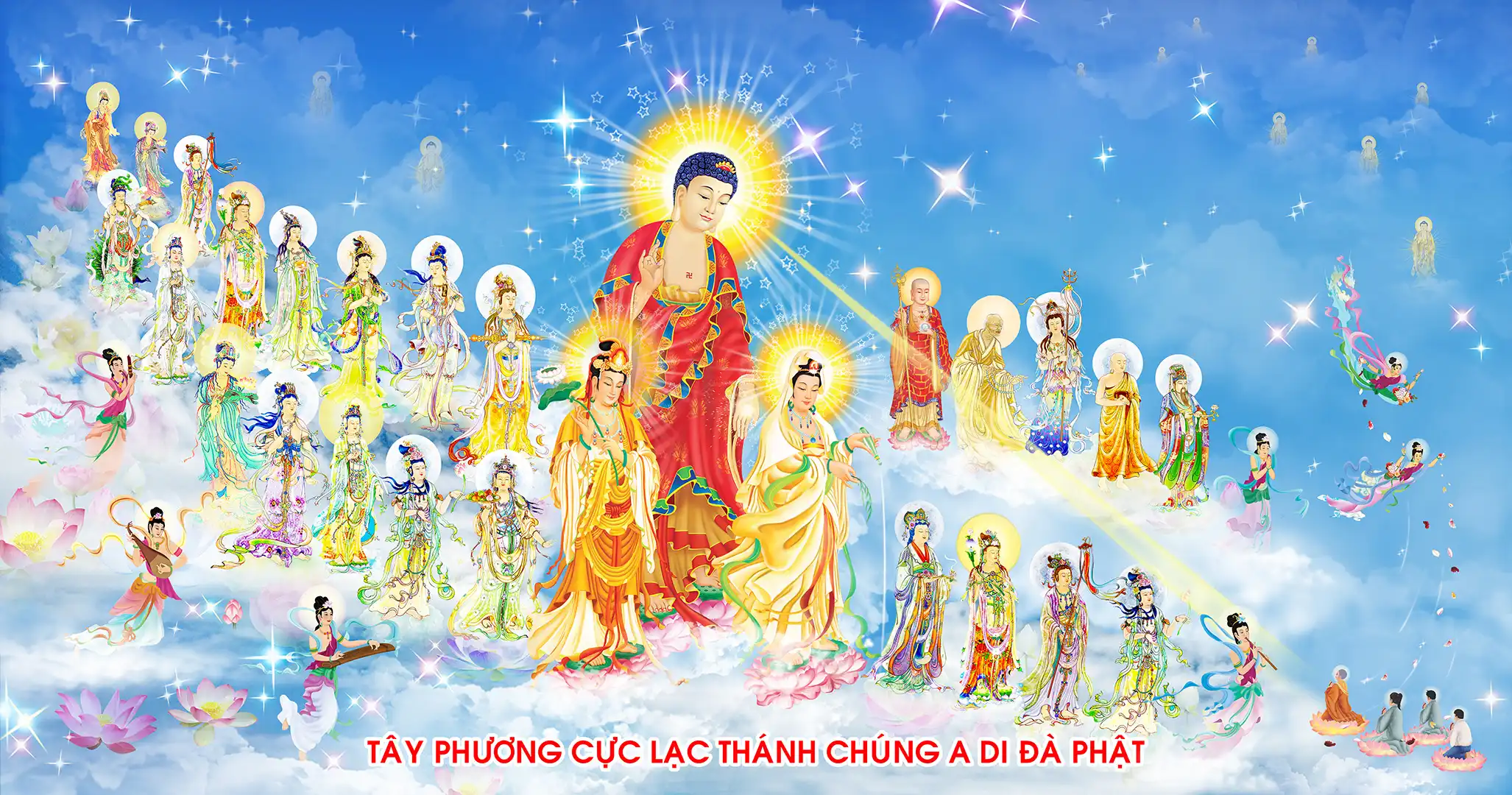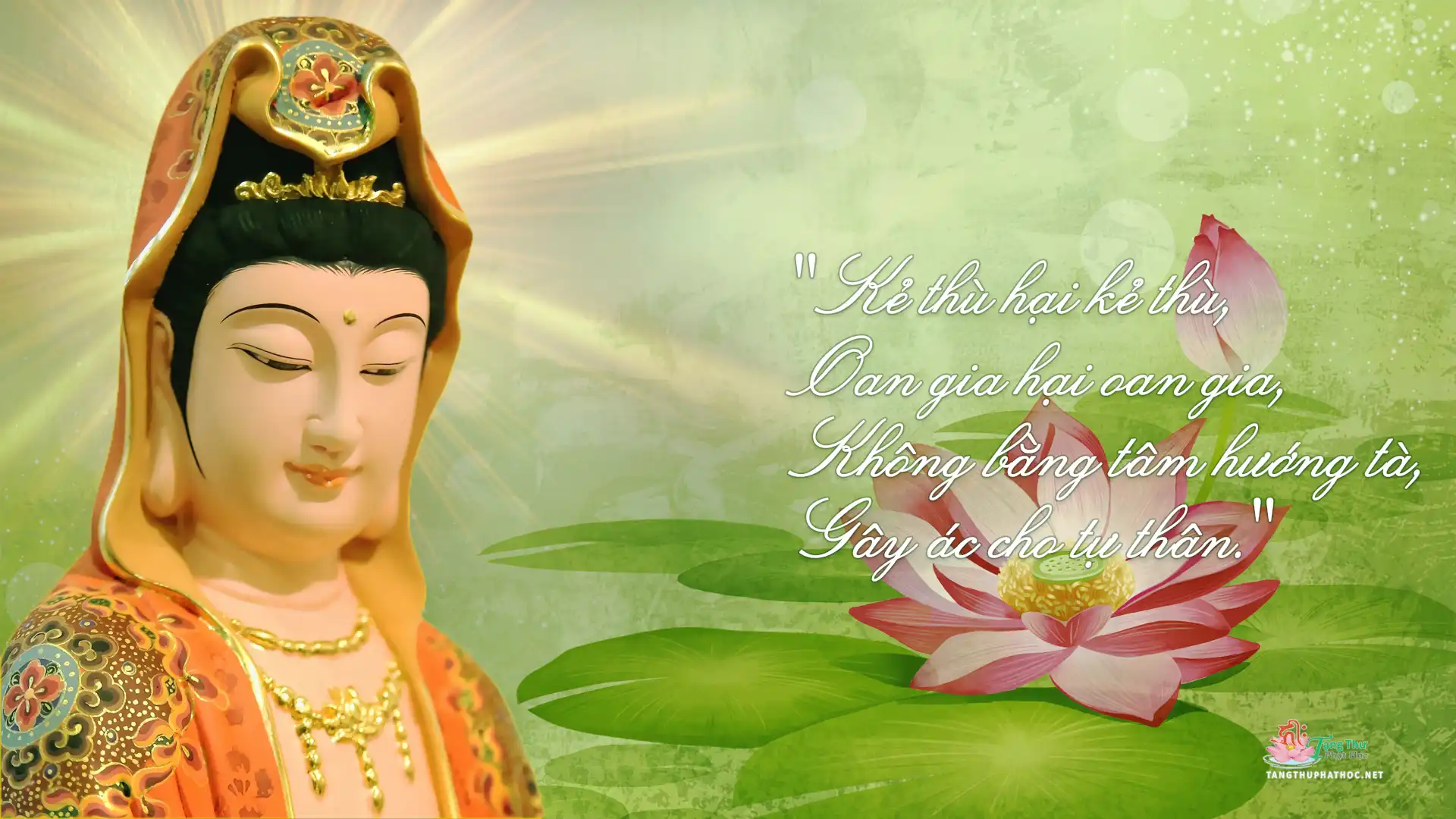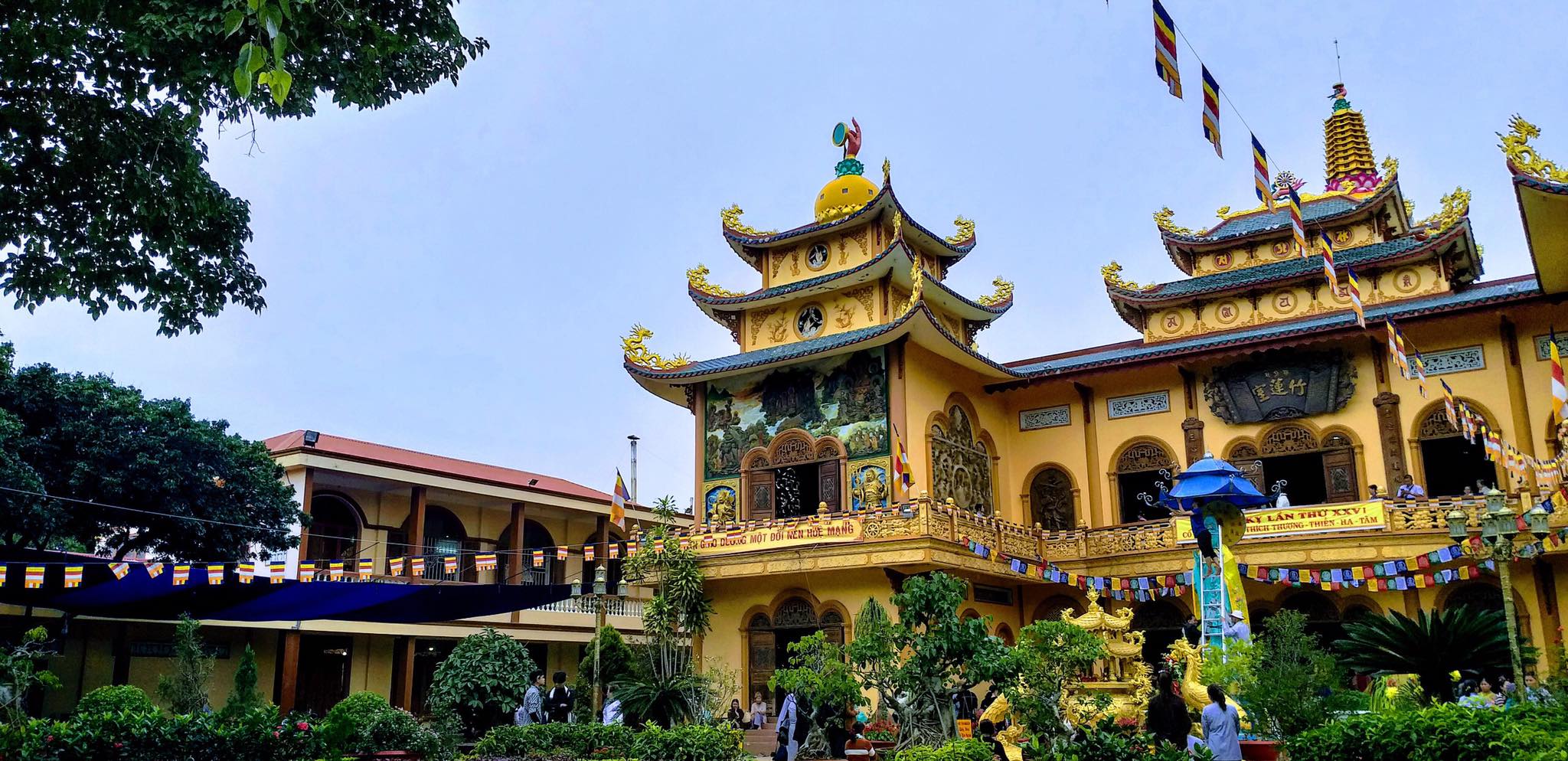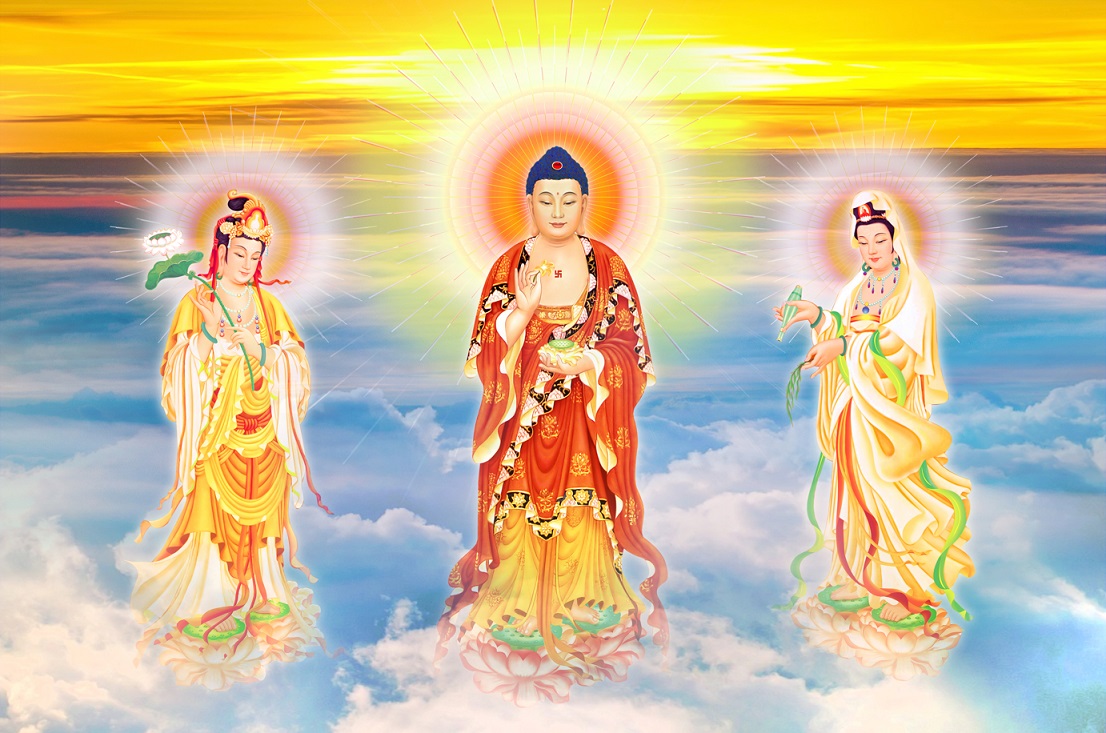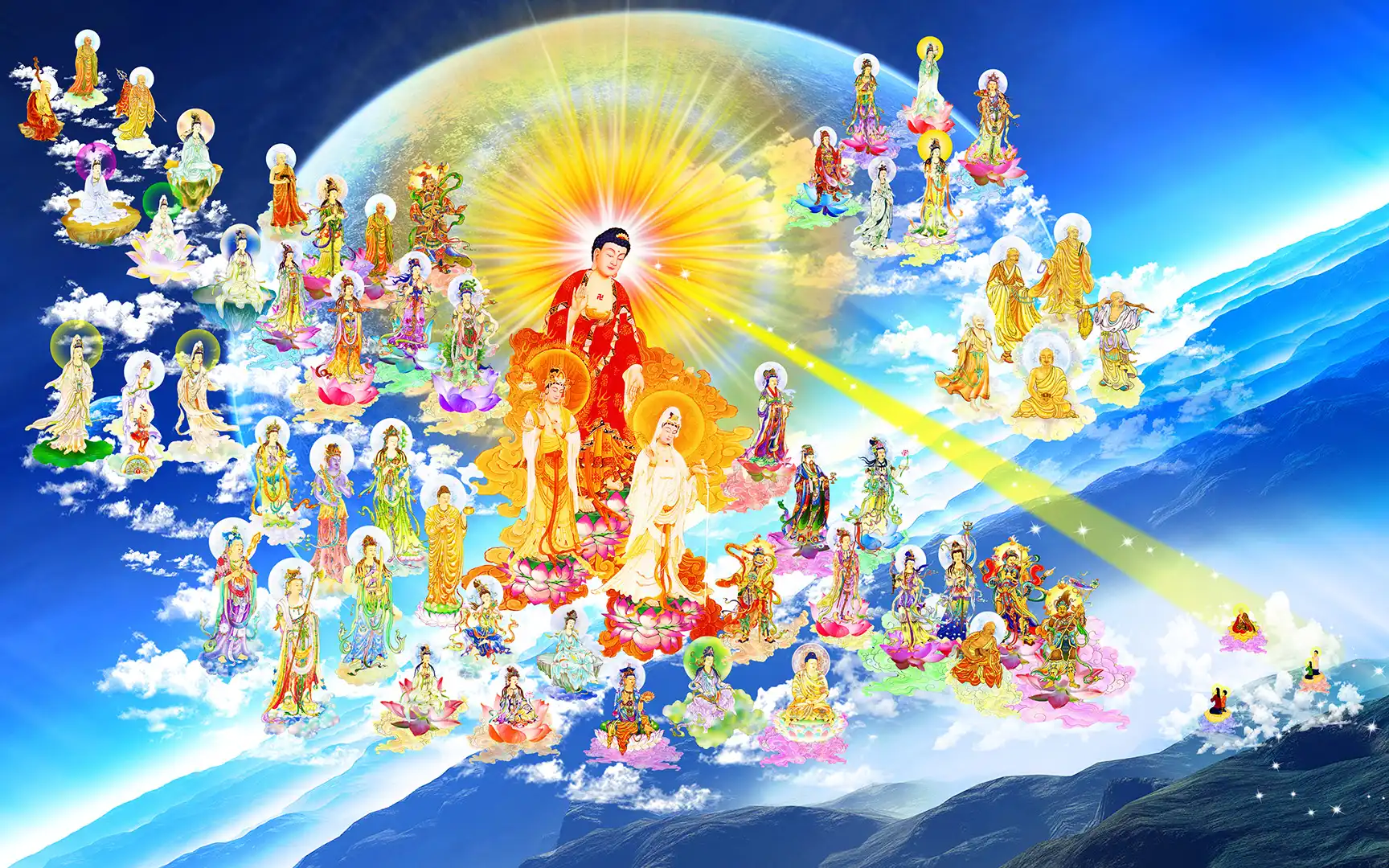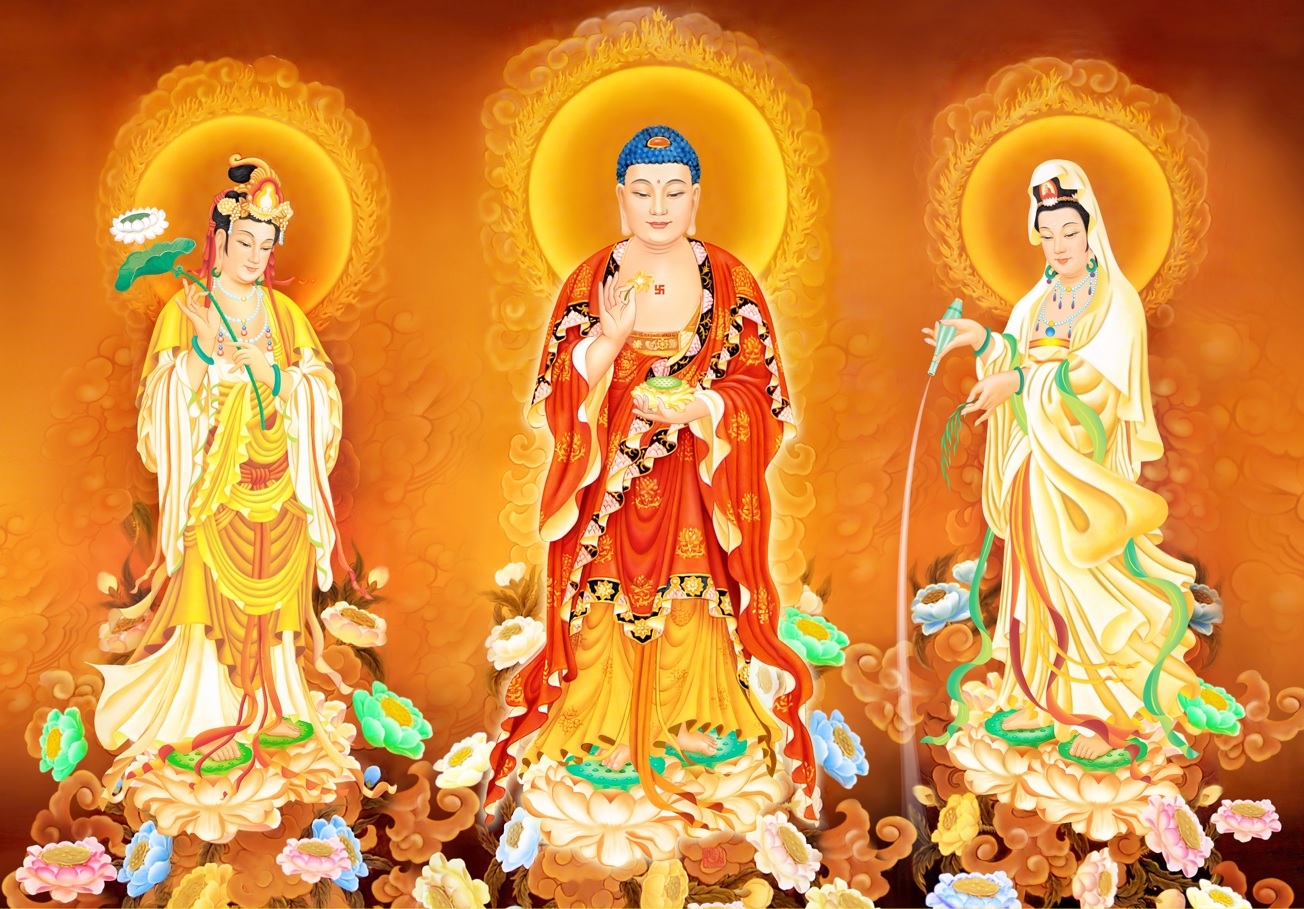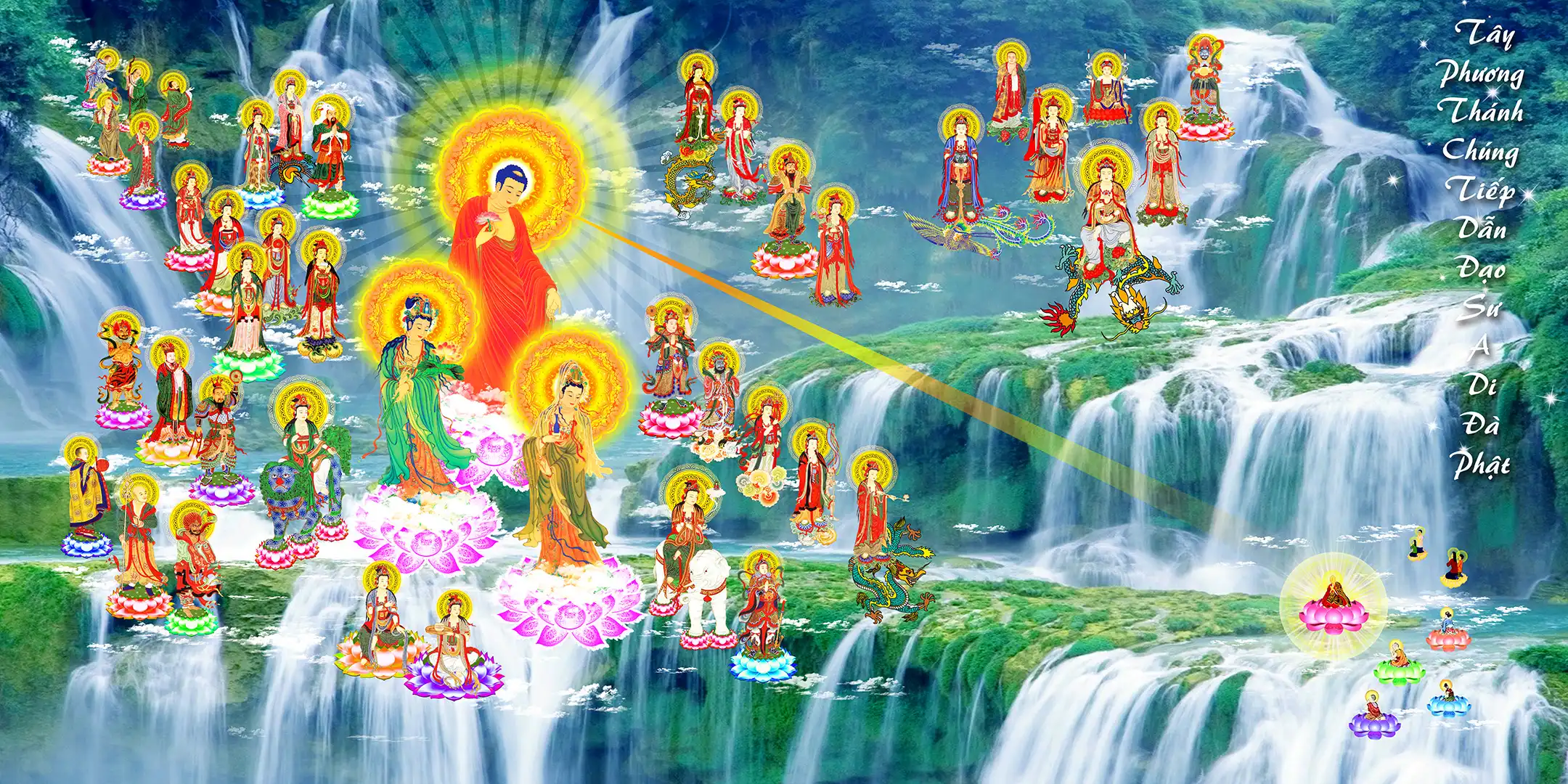THE SORROWLESS FLOWERS
Thiện Phúc
VOLUME II
251. Loving-Kindness and Compassion
252. Kindness and Compassion
253. Six Paramitas
254. Almsgiving (Charity)
255. Dana-Paramita
256. Observation of Precepts
257. Right Effort
258. Endurance
259. Ksanti-Paramita
260. Endurance and Moderation
251. Loving-Kindness and Compassion
In Buddhism, loveing-kindness is one of the greatest emotions toward all sentient beings. Immeasurable loving kindness is the greatest love dedicated to all sentient beings, together with the desire to ring them joy and happiness. Human joy is totally impermanent; it is governed by misery, that is, when our passions such as greed, anger, and ignorance are satisfied, we feel pleased; but when they are not satisfied, we feel sad. To have a permanent joy, we must first sever all sufferings. Loving kindness generally goes together with pity whose role is to help the subjects sever his sufferings, while the role of loving kindness is to save sentient beings from sufferings and to bring them joy. However, loving-kindness is not an inborn characterictic. If we really want to develop our loving-kindness, we have to devote more time to practice. Sitting in meditation alone cannot bring us the so-called “loving-kindness.” In order to achieve the loving-kindness, we must put loving-kindness in actions in our daily life. In our daily activities, we must develop empathy and closeness to others by reflecting on their sufferings. For example, when we know someone suffering, we should try our best to console them by kind words or to help them with our worldly possessions if needed.
Loving-kindness has the power of bestowing temporal happiness upon us in this lifetime. Without love, people in this world will encounter a lot of problems (anger, hatred, jealousy, envy, arrogance, etc). A Buddhist should develop love for all sentient beings and to cherish others more than oneself. Love should be given equally to everyone including relatives or strangers, friends or foes, given without any conditions, without self-interests or attachment. First, loving kindness or love will help us gain strong meritoious power. Second, when we offer loving kindness to other people, we will gain their love and respect at the same time. Third, loving kindness helps us overcome all kinds of graspings of wealth, and other hindrances. Fourth, loving kindness help us experience more physical confort. Fifth, loving-kindness (benevolence) is one of the most important entrances to the great enlightenment; for with it, good roots prevail in all situations in our daily life.
According to the Vimalakirti Sutra, Chapter Seventh, Contemplating at Living Being, when Manjusri called on to enquire Vimalakirti’s illness, Manjusri asked Vimalakirti: “When a Bodhisattva meditates, how should he practise kindness (maitri)? Vimalakirti replied: When a Bodhisattva has made this meditation, he should think as the followings. First, devout Buddhists should teach living beings to meditate in the same manner; this is true kindness. Second, devout Buddhists should practise causeless (nirvanic) kindness which prevents creativeness. Third, devout Buddhists should practice unheated kindness which puts an end to klesa (troubles and causes of trouble). Fourth, devout Buddhists should practice impartial kindness which coves all the three periods of time (which means that it is eternal involving past, future and present). Fifth, devout Buddhists should practice passionless kindness which wipes out disputation. Sixth, devout Buddhists should practice non-dual kindness which is beyond sense organs within and sense data without. Seventh, devout Buddhists should practice indestructible kindness which eradicates all corruptibility. Eighth, devout Buddhists should practice stable kindness which is a characteristic of the undying self-mind. Ninth, devout Buddhists should practice pure and clean kindness which is spotless like Dharmata. Tenth, devout Buddhists should practice boundless kindness which is all-pervasive like space. Eleventh, devout Buddhists should practice the kindness of the arhat stage which destroys all bondage. Twelfth, devout Buddhists should practice the Bodhisattva kindness which gives comfort to living beings. Thirteenth, devout Buddhists should practice the Tathagata kindness which leads to the state of thatness. Fourteenth, devout Buddhists should practice the Buddha kindness which enlightens all living beings. Fifteenth, devout Buddhists should practice spontaneous kindness which is causeless. Sixteenth, devout Buddhists should practice Bodhi kindness which is one flavour (i.e. uniform and unmixed wisdom). Seventeenth, devout Buddhists should practice unsurpassed kindness which cuts off all desires. Eighteenth, devout Buddhists should practice merciful kindness which leads to the Mahayana (path). Nineteenth, devout Buddhists should practice untiring kindness because of deep insight into the void and non-existent ego. Twentieth, devout Buddhists should practice Dharma-bestowing (dana) kindness which is free from regret and repentanceShould practice Dharma-bestowing (dana) kindness which is free from regret and repentance. Twenty-first, devout Buddhists should practice precepts (sila) upholding kindness to convert those who have broken the commandments. Twenty-second, devout Buddhists should practice patient (ksanti) kindness which protects both the self and others. Twenty-third, devout Buddhists should practice Zealous (virya) kindness to liberate all living beings. Twenty-fourth, devout Buddhists should practice serene (dhyana) kindness which is unaffected by the five senses. Twenty-fifth, devout Buddhists should practice wise (prajna) kindness which is always timely. Twenty-sixth, devout Buddhists should practice expedient (upaya) kindness to appear at all times for converting living beings. Twenty-seventh, devout Buddhists should practice unhidden kindness because of the purity and cleanness of the straightforward mind. Twenty-eighth, devout Buddhists should practice profound minded kindness which is free from discrimination. Twenty-ninth, devout Buddhists should practice undeceptive kindness which is faultless. Thirtieth, devout Buddhists should practice joyful kindness which bestows the Buddha joy (in nirvana). “Such are the specialities of Bodhisattva kindness”Should practice joyful kindness which bestows the Buddha joy (in nirvana). “Such are the specialities of Bodhisattva kindness”.
In the Dhammapada Sutta, the Buddha taught: “Loving-kindness is the only way to destroy hatred. Hatred cannot be defeated with more hatred. There is no greater love in this world than the love of the mother and father. If a person, carrying father on the left shoulder and mother on the right shoulder, were to walk around the Sumeru Mountain hundreds of thousands of times, with blood covering both feet, it would still not be enough to repay the love and hardship of child rearing.” According to the Metta Sutta, the Buddha taught: “May all beings be happy and secure. May their mind be contented. Whatever beings there may be, feeble or strong, long, great or medium, small or large, seen or unseen, those dwelling far or near, those who are born, and those who are yet to be born. May all beings, without exception, be happy… Just as a mother would protect her only child, even at the risk of her own life, even so, let one cultivate boundless heart towards all beings. Let one’s thoughts of boundless love pervade the whole world, above, below and across, without any obstruction, any hatred or any enmity.”
252. Kindness and Compassion
According to Most Venerable Thích Thiền Tâm in The Thirteen Patriarchs of Pureland Buddhism, what is the ‘compassionate mind?’ To be compassionate is to pity and to be empathetic, wishing to help and rescue others without having discriminations or attachment to various characteristics. This means ‘altruism’ or to have mercy and compassion, wishing to help others but not to have any intention of taking advantages. For instance, seeing someone rich, beautiful, etc, one pretends to be compassionate by helping, but having ulterior motives of self-gain. This is called “Desirous Views,” or developing love and lust when seeing wealth and beauty according to binding ways of sentient beings; thus, to act in this way cannot be called being ‘compassionate.’ It was the spirit of loving-kindness and compassion taught by the Buddha that touched the heart of King Asoka, the great Buddhist Emperor of India in the third century B.C. Before he became a Buddhist he was a warlike monarch like his father, King Bimbisara, and his grandfather, King Candragupta. Wishing to extend his territories he invaded and conquered Kalinga. In this war thousands were slain, while many more were wounded and taken captive. Later, however, when he followed the Buddha’s creed of compassion he realized the folly of killing. He felt very sad when he thought of the great slaughter, and gave up warfare. He is the only military monarch on record who after victory gave up conquest by war and inaugurated conquest by righteousness. As his Rock Edict XIII says, ‘he sheathed the sword never to unsheath it, and wish no harm to living beings.’ The spread of the Buddha’s creed of compassion throughout the Eastern world was largely due to the enterprise and tireless efforts of Asoka the Great. The Buddha-law made Asia mild and non-aggressive. However, modern civilization is pressing hard on Asian lands. It is known that with the rise and development of the so-called civilization, man’s culture deteriorates and he changes for the worse. With the match of modern science very many changes have taken place, and all these changes and improvements, being material and external, tend to make modern man more and more worldly minded and sensuous with the result that he neglects the qualities of the mind, and becomes self-interested and heartless. The waves of materialism seem to influence mankind and affect their way of thinking and living. People are so bound by their senses, they live so exclusively in the material world that they fail to contact the good within. Only the love and compassion taught by the Buddha can establish complete mental harmony and well-being.
253. Six Paramitas
According to the Sanskrit language, Paramita means crossing-over. Six Paramitas mean the six things that ferry one beyond the sea of mortality to nirvana. Six stages of spiritual perfection followed by the Bodhisattva in his progress to Buddhahood. The six virtues of perfection are not only characteristic of Mahayana Buddhism in many ways, they also contain virtues commonly held up as cardinal by all religious systems. They consist of the practice and highest possible development. Thus, practicing the six paramitas will lead the practitioner to cross over from the shore of the unenlightened to the dock of enlightenment. Devout Buddhists always know that the Six Paramitas are the basic methods of cultivation for a Buddhist, but we do not try to practice them. To meet anyone at anywhere we always talk about the Six Perfections, but when the situation comes, we do not want to practice giving, we do not keep the precepts, we cannot tolerate any circumstances, we are not vigorous, we do not set aside time to practice meditation, and as a result, we can not use real wisdom to conduct our daily activities. So, what is the use of the cultivation of outside appearance? There are people who do not want to give out a cent; on the contrary, they demand others to give to them, the more the better. They always want to gain the advantage and not take a loss. We all know that holding precepts means keeping the precepts that the Buddha taught, but when states come, we break the precepts instead of keeping them. Although we all know that patience can take us to the other shore, but when we meet a difficult situation, we can never be patient. Everyone wants to be vigorous, but only vigorous in worldly businesses, not in cultivation. We all know that we should meditate to concentrate our mind so that wisdom can manifest, but we only talk and never practice. For these reasons, the Buddha taught the Six Perfections: giving means to give wealth or Buddhadharma to others, holding precepts means to keep the precepts that the Buddha taught and to refrain from wrong-doings, patience means to patiently endure the things that do not turn out the way we wish them to, vigor means to be vigorous in cultivation, meditation means to concentrate our mind until there are no more idle thoughts, and wisdom enables us to reach the other shore and end birth and death.
254. Almsgiving (Charity)
Charity in Sanskrit is “Dana”, meaning “almsgiving.” In general this refers to an attitude of generosity. It involves developing an attitude of willingness to give away whatever one has in order to benefit sentient beings. In Mahayana Buddhism, this is one of the six paramitas or virtues of perfection. Charitable giving, the presentation of gift or alms to monks and nuns (the virtue of alms-giving to the poor and needy or making gifts to a bhikkhu or community of bhikkhus). Voluntary giving of material, energy, or wisdom to others, regarded as one of the most important Buddhist virtues. Dana is one of the six perfections (paramitas) and one of the most important of the meritorious works that a Bodhisattva cultivates during the path to Buddhahood. In Theravada Buddhism, it is one of the ten “contemplations” (anussati) and the most important meritorious activities (punya). It is seen as a key component in the meditative path, as it serves to overcome selfishness and provide benefits in both the present and future lives. Nowadays, the practice of giving alms to monks and nuns by laypeople is also called “dana,” and it is one of the most important religious activities for non-monastics in East Asian countries. Laypeople believe that gifts given to the Samgha would bring geater benefits than giving to other people, for besides the Buddha, monks and nuns are also referred as “fields of merit” in Buddhism.
One should help other people, as best as one can, to satisfy their needs. When giving charity, one does not cherish the thought that he is the giver, and sentient beings are the receivers, what is given and how much is given, thus, in one’s mind no arrogance and self-conceit would arise. This is an unconditioned alms-giving or compassion on equlity basis. Dana paramita is also a gate of Dharma-illumination; for with it, in every instance, we cause creatures to be pleasant, we adorn the Buddhist land, and we teach and guide stingy and greedy living beings. Especially, Bodhisattvas give alms to all beings, so that they may be happy without investigating whether they are worthy or not. In the Jataka literature, many stories are found which show how the Bodhisattva fulfilled the Paramita-charitable giving, the former birth stories of Gautama, when he was a Bodhisattva, either in human form or non-human form, it is written that he practiced such types of Paramita-charitable giving. In the Mahakapi Jataka, the Bodhisattva is a great monkey leader, who at the attack by men of the Varanasi king, allowed fellow monkeys to pass off safely by treading on his body, stretched as the extension of a bridge. In the Sasa Jataka, the Bodhisattva is a young hare who offers his own body in the absence of any other thing to offer, just to observe the sacred vow. The story of Prince Vessantara, which is widely appreciated, shows Prince Vessantara in fulfillment of his vow to give whatever he is asked to give, not only surrenders the palladium of his father’s kingdom, but even his own wife and children. According to the Visuddhimaga, Great Enlightening Beings are concerned about the welfare of living beings, not tolerating the sufferings of beings, wishing long duration to the higher states of happiness of beings and being impartial and just to all beings, by fulfilling the Paramita-charitable giving they fulfill all other paramitas. According to the Apadana, the Bodhisattva gave the gift to the needy. He then observed precepts perfectly and fulfilled the paramitas in the worldly renunciation. He then attained the Supreme Enlightenment.
According to Vietnamese-Chinese terms, Bố means wide or unlimited, Thí means giving. “Charity” (Bố Thí) means to give without any limits. Almsgiving of food or doctrine, with resultant benefits now and also hereafter in the form of reincarnation, as neglect or refusal will produce the opposite consequences. The Buddha taught: “Greed is the origin of various pains and sufferings in the cycle of births and deaths. For if there is greed, there is attachment; if there is attachment, there is bondage; if there is bondage, there is the cylcle of briths and deaths; if there is a cycle of rebirths, one is still a sentient being; if one is still a sentient being, there are still pains, sufferings, and afflictions.” Realizing the calamities from greediness, the Buddha emphasized a dharma door of generosity. In the explanation of the Sutra on The Eight Realizations of the Great Beings, Zen Master Thích Nhất Hạnh explained “Practicing Generosity” as follow: ‘Practicing generosity means to act in a way that will help equalize the difference between the wealthy and the impoverished. Whatever we do to ease others’ suffering and create social justice can be considered praticing generosity. Practicing generosity is the first of the six paramitas. Paramita means to help others reach the other shore, the shore of liberation from sickness, poverty, hunger, ignorance, desires and passions, and birth and death. However, Buddha-dharma is always easy to speak but difficult to do. Giving means to give wealth or Buddha-dharma to others, but when you are in a situation to do so, you do not want to do. On the contrary, you demand that others give to you, the more the better. This is why people say “Buddha-dharma is always easy to speak but difficult to do.” Buddhists should know that both concepts of “giving to charity” and “making offerings” mean the same thing. With regard to sentient beings, this act is called “Giving.” With regard to parents, religious teachers, Patriarchs, and other enlightened beings, this act is called “Making offerings.” According to the Visuddhimagga, Buddhaghosa defines “Dana” as follows: “Danam vuccati avakkhandham”, means to give with heart is really called the “Dana”, though the word “Dana” literally stands for 1) charity, 2) genrosity, 3) alms-giving, 4) liberality, etc. It is Bodhisattva’s perfection of gift when he offers, gives up or remains indifferent to his body.
Besides, there are other kinds of dana. First, giving out of gratitude or giving in return for kindness received or one gives, thinking: “He gave something.” This is one of the eight causes of dana or giving according to the Kosa Sastra. Second, giving courage to someone. or bestowing of courage. The bestowing of confidence by every true Buddhist, i.e. that none may fear him. Absence or removal of fear, one of the three forms of giving. Giving out of fear or giving for fear of evil or one gives from fear. This is one of the eight causes of dana or giving according to the Kosa Sastra and Sangiti Sutta in the Long Discourses of the Buddha. Third, giving for personal virtue or for the adornment of the heart and life. This is one of the eight causes of dana or giving according to the Kosa Sastra. Fourth, giving dedicated to enlightenment, transcended the created and the uncreated. Fifth, giving in hope of bliss in the heaven, or giving because of hoping to be reborn in a particular heaven. This is one of the eight causes of dana or giving according to the Kosa Sastra. Sixth, giving of the doctrine. Giving of the dharma to preach or to speak Dharma to save sentient beings. Giving the Buddha’s truth to save sentient beings. Seventh, giving because of tradition or custom or continuing the parental example of giving (one gives, thinking: “It is good to give.”). This is one of the eight causes of dana or giving according to the Kosa Sastra. Eighth, giving because of hoping to adorn and prepare one’s heart. This is one of the eight bases for giving according to the Sangiti Sutta in the Long Discourses of the Buddha. Ninth, giving as occasion offers, or giving of convenience or to those who come for aid. Giving according to wishes, satisfying others. This is one of the eight causes of dana or giving according to the Kosa Sastra and Sangiti Sutta in the Long Discourses of the Buddha. Tenth, giving appropriately, knowing superior, mediocre, and inferior. Eleventh, giving for acquiring a good reputation, or giving in hope of an honoured name (one gives, thinking: “If I make this gift I shall acquire a good reputation). This is one gives, thinking: “If I make this gift I shall acquire a good reputation. This is one of the eight bases for giving according to the Sangiti Sutta in the Long Discourses of the Buddha. This is also one of the eight causes of dana or giving according to the Kosa Sastra.
There are two kinds of dana or charity. First, giving of goods. Second, giving the Buddha’s truth to save sentient beings. There are also two different kinds of dana or charity. First, pure or unsullied charity, which looks for no reward here but only hereafter (expecting no return). Second, impure or sullied charity whose object is personal benefit (expecting something in return). There are three levels of dana. The first level of dana is the low degree of dana-paramita. With compassion, a person gives alms (ordinary goods) to his relatives, wife, children… This is called Dana-parami or “given in low degree.” The second level of dana is the middle degree of dana-paramita. With compassion, a person his own head, eyes, arms, legs… This is called Dana-uppaparami or “given in middle degree.” The third level of dana is the high degree of dana-paramita. With compassion, a person gives his own life. This is called Dana-paramattha-parami or “given in high degree.” Besides, there are three different kinds of generosity. The first kind of dana is “Giving of material objects”. Giving of material goods, that is, to give others money or goods. In this world, there is no one who is unable to perform some form of giving. No matter how impoverished one is, he should be able to give alms to those who are worst off than he or to support a public work with however small a donation, if he has the will to do so. Even if there is someone who absolutely cannot afford to do so, he can be useful to others and to society by offering his services. Giving of goods (or donating material goods such as flesh, food, meat, prey, gift, etc). Giving of wealth includes both outer and inner wealth. The outer wealth refers to one’s kingdom and treasures, one’s wife and sons. Those who practice the Bodhisattva way have no mark of self so they are able to give away their kingdom, their homes and even their wives and sons. Sakyamuni Buddha for example should have become a king, but he chose instead to become a monk. He left his wife and his newly born son. Relinquishing the glory of royalty. He went to the state of homelessness. The inner wealth, on the other hand, refers to one’s own body, head, eyes, brains and marrow, skin, blood, flesh and bones. All can be given to others. The second kind of dana is the “giving of law”. If we feel satisfied only with the giving of wealth and materials, without helping sentient beings cultivate to transform their sufferings and afflictions, according to the Buddha is not enough. The Buddha reminded about the supreme method in helping sentient beings is to help them cultivate wholesome deeds. According to the Maharatnakuta Sutra, Chapter XXIV, the Bodhisattva Wonderful Sound preaches Dharmaparyaya in various shapes to different beings according to their ability and capacity. In Chapter XXV, Avalokitesvara Bodhisattva also preaches Dharmaparyaya in various shapes to different beings. According to the Buddha, there are two gifts, the carnal and spiritual. Of these two gifts, the spiritual is prominent. Giving of law means to teach others rightly. A person who has knowledge or wisdom in some field should be able to teach others or guide them even if he has no money or is physically handicapped. Even a person of humble circumstances can perform giving of the Law. To speak of his own experience in order to benefit others can be his giving of the Law. Therefore, according to Buddhism, giving of the law is to teach and transform all living beings by explaining the Buddha-dharma to them. The third kind of dana is the “giving of fearlessness”. Giving of fearlessness means to remove the anxieties or sufferings of others through one’s own effort. To comfort others in order to help them overcome their difficult time can be considered as “giving of fearlessness.” When someone is terrified in encountering disasters or calamities, we try to use our own words or other efforts to remove his anxities, sufferings and afflictions, this is the gift of fearlessness. The giving of fearlessness is the best way that can attribute a peaceful and happy atmosphere for everyone.
There are four kinds of dana. First, giving of pens for other people to write the sutras. Second, giving of ink for other people to write the sutras. Third, giving of the sutras for other people to recite. Fourth, preaching the sutras for sentient beings so that they can cultivate to liberate themselves. There are five kinds of almsgiving. First, offer the alsmgiving to those from afar (a distance). Second, offer the almsgiving to those going afar (going to a distance). Third, offer the almsgiving to the sick. Fourth, offer the almsgiving to the hungry. Sixth, offer the almsgiving to those wise in Buddhist doctrine. Besides these five kinds of giving, there are five kinds of people who pretend to give out of goodness of their hearts. The first kind of givers are people who talk of goodness or giving, but they never carry out what they say, only hollow speech or empty promises. The second kind of givers are people who speech and actions contradict one another. The third kind of givers are people who give but their minds always hope that their actions will be compensated and be returned in some way. The fourth kind of givers are people who give little but want a great deal in return. The fifth kind of givers are people who plant few seeds but wish to harvest abundance of fruits.
There are seven kinds of offerings. First, almsgiving to visitors or callers. Second, almsgiving to travellers. Third, almsgiving to the sick. Fourth, almsgiving to the nurses. Fifth, almsgiving to the monasteries. Sixth, almsgiving of daily food to the monks and nuns. Seventh, general almsgiving of clothing and food according to season. There are physical offerings (to offer service by one’s labor), spiritual offerings (to offer a compassionate heart to others), offerings of eyes (to offer a warm glance to others which will give them tranquility), offerings of countenance (to offer a soft countenance with smile to others), oral offerings (to offer kind and warm words to relieve others), seat offerings (to offer one’s seat to others), and offerrings of shelters (to let others spend the night at one’s home). There are seven grounds for a happy karma through benevolence to the needy. First, almsgiving to visitors, travellers or strangers. Second, help the sick and their nurses. Third, gifts of gardens and groves to monasteries. Fourth, regular provision of food for the monks and the nuns. Fifth, regular provision of clothes for the monks and the nuns. Sixth, regular provision of medicines to the monks and the nuns. Seventh, practice Almsgiving whenever possible. According to The Middle Length Discourses of the Buddha, Dakkhinavibhanga Sutra, there are seven kinds of offerings made to the Sangha. First, one gives offering to a Sangha of both Bhikkhus and Bhikkhnis headed by the Buddha. Second, one gives offering to a Sangha of both Bhikkhus and Bhikkhunis after the Tathagata has attained final Nirvana. Third, one gives offering to a Sangha of Bhikkhus. Fourth, one gives offering to a Sangha of Bhikkhunis. Fifth, one gives offering and saying: “Appoint so many bhikkhus and Bhikkhunis for me from the Sangha. Sixth, one gives offering, saying: “Appoint so many Bhikkhus for me from the Sangha.” Seventh, one gives offering, saying: “Appoint so many Bhikkhunis for me from the Sangha.”
According to the Kosa Sastra, there are eight causes of dana or giving. First, one gives as occasion offers, or giving of convenience or to those who come for aid. Second, giving for fear of evil. One gives from fear, or giving out of fear. Third, giving out of gratitude or giving in return for kindness received. One gives, thinking: “He gave something.” Fourth, seeking-reward giving or anticipating gifts in return. One gives, thinking: “I give him something now, he will give me back something in the future.” Fifth, giving because of tradition or custom, continuing the parental example of giving (one gives, thinking: “It is good to give”). Sixth, giving because of hoping to be reborn in a particular heaven. Seventh, giving for gaining name and fame or giving in hope of an honoured name. One gives, thinking: “If I make this gift I shall acquire a good reputation. Eighth, giving for personal virtue or for the adornment of the heart and life. According to the Sangiti Sutta in the Long Discourses of the Buddha, there are eight bases for giving. First, one gives as occasion offer. Second, one gives from fear. Third, one gives, thinking, “he gave me something.” Fourth, one gives, thinking: “he will give me something.” Fifth, one gives, thinking: “it is good to give.” Sixth, one gives, thinking: “I am cooking something, they are not. It would not be right not to give something to those who are not cooking.” Seventh, one gives, thinking: “If I make this gift I shall acquire a good reputation. Eighth, one gives, thinking to adorn and prepare one’s heart.
According to the Flower Adornment Sutra, Chapter 38, there are ten kinds of pure giving of Great Enlightening Beings. Enlightening Beings who abide by these ten principles can accomplish the supreme, pure, magnanimous giving of Buddhas. First, impartial giving, not discriminating among sentient beings. Second, giving according to wishes, satisfying others. Third, unconfused giving, causing benefit to be gained. Fourth, giving appropriately, knowing superior, mediocre, and inferior. Fifth, giving without dwelling, not seeking reward. Sixth, open giving, without clinging attachment. Seventh, total giving, being ultimately pure. Eighth, giving dedicated to enlightenment, transcended the created and the uncreated. Ninth, giving teach to sentient beings, never abandoning them, even to the site of enlightenment. Tenth, giving with its three spheres pure, observing the giver, receiver, and gift with right awareness, as being like space.
There are also twelve kinds of people who have truly good heart and genuine giving. First, benefit others without asking for anything in return. Second, help others without wishing for something in return. Third, make offerings to others without wishing for compensation, not even to be thanked. Fourth, lower themselves, or less emphasis on self-importance, so others’ wishes will be fully realized. Fifth, let go of things that are difficult to let go. Sixth, tolerate things that are difficult to tolerate. Seventh, accomplish things that are difficult to accomplish. Eighth, rescue when it is difficult to rescue. Ninth, not to discriminate between relatives or strangers, but maintain an equal and fair mind in helping others as well as carrying out conducts that are proper to the truths. Tenth, speak of goodness, then they should be able to “make good” what they say. This means speech and action are consistent with one another. Eleventh, have kind and gentle souls, who often carry out wholesome conducts without boasting to everyone. Twelfth, have only intent is simply to help others. Otherwise, they do not hope for fame, praise, notoriety or for self-benefits.
Giving also includes boundless giving and no attachment in acts of charity. Boundless giving will bring the benefactors infinite and endless meritorious retributions. There are five categories of boundless giving. First, give to the Buddha. Second, give to the Sangha, or community of ordained Buddhist monks or nuns. Third, give to those who speak and eludicate the Proper Dharma. Fourth, give to one’s father. Fifth, give to one’s mother. According to the Diamond Sutra, the Buddha reminded Sibhuti about “acts of charity without attachment” as follows: “Subhuti! Bodhisattvas in truth have no attachment in cts of charity. One should not attach to sight while giving. One should not attach to sound, smell, taste, touch, or conciousness in giving. Subhuti ! Bodhisattvas should give without attachment. Why ? If they do, the merits and virtues are immeasurable. Also, Subhuti! Bodhisattvas who give without attachment have equal amounts of merit and virtue. It is incomprehensible and immeasurable. Subhuti! If Bodhisattvas give with attchments, they are walking in darkness and see nothing. If Bodhisattvas give witohout attachments, they are walking under the sunand everything is clear.”
In the Dharmapada Sutra, the Buddha taught: “Some people give according to their faith, or according to their pleasure. He who is envious of others’ food and drink, will not attain tranquility by day or by night (Dharmapada 249). He who fully cut off, uprooted and destroyed such feeling, gain peace by day and by night (Dharmapada 250). No gift is better than the gift of Truth (Dharma). No taste is sweeter than the taste of truth. No joy is better than the joy of Truth. No conquest is better than the conquest of craving; it overcomes all suffering (Dharmapada 354). Human beings are damaged by lust just as weeds damage the fields. Therefore, what is given to those who are lustless, yields great reward (Dharmapada 356). Human beings are damaged by hatred in just the same manner as weeds damage the fields. Therefore, to give to those who are free from hatred, yields great reward (Dharmapada 357). Human beings are damaged by delusion just like weeds damage the fields. Therefore, to give to those who are free from delusion, yields great reward (Dharmapada 358). Human beings are damaged by craving just like weeds damage the fields. Therefore, to give to those who rid of craving, yields great reward (Dharmapada 359).” In the Forty-Two Sections Sutra, the Buddha taught: “When you see someone practicing the Way of Giving, help him joyously and you will obtain vast and great blessings. A Saramana asked: ‘Is there an end to those blessings?’ The Buddha said: ‘Consider the flame of a single lamp, though a hundred thousand people come and light their own lamps from it so that they can cook their food and ward off the darkness, the first lamp remains the same as before. Blessings are like this, too’ (Chapter 10). The Buddha said: “Giving food to a hundred bad people does not equal to giving food to a single good person. Giving food to a thousand good people does not equal to giving food to one person who holds the five precepts. Giving food to ten thousand people who hold the five precepts does not equal to giving food to a single Srotaapanna. Giving food to a million Srotaapannas does not equal to giving food to a single Sakridagamin. Giving food to ten million Sakridagamins does not equal to giving food to one single Anagamin. Giving food to a hundred million Anagamins does not equal to giving food to a single Arahant. Giving food to ten billion Arahants does not equal to giving food to a single Pratyekabuddha. Giving food to a hundred billion Pratyekabuddhas does not equal to giving food to a Buddha of the Three Periods of time. Giving food to ten trillion Buddhas of the Three Periods of time does not equal to giving food to a single one who is without thoughts, without dwelling, without cultivation, and without accomplishment (Chapter 11).” Charity does not merely mean to give away what one has in abundance, but it involves even the giving-up of one’s whole being for a cause. Charity, or giving, including the bestowing of the truth and courage giving on others. Giving Paramita is used to destroy greed, selfishness, and stinginess, at the same time to increase blessings. According to the Sutra In Forty-Two Sections, Chapter 10, the Buddha said: “When you see someone practicing the Way of Giving, help him joyously and you will obtain vast and great blessings. A Saramana asked: ‘Is there an end to those blessings?’ The Buddha said: ‘Consider the flame of a single lamp, though a hundred thousand people come and light their own lamps from it so that they can cook their food and ward off the darkness, the first lamp remains the same as before. Blessings are like this, too’.”
255. Dana-Paramita
Paramita-charitable giving: One should help other people, as best as one can, to satisfy their needs. When giving charity, one does not cherish the thought that he is the giver, and sentient beings are the receivers, what is given and how much is given, thus, in one’s mind no arrogance and self-conceit would arise. This is an unconditioned alms-giving or compassion on equlity basis. Dana paramita is also a gate of Dharma-illumination; for with it, in every instance, we cause creatures to be pleasant, we adorn the Buddhist land, and we teach and guide stingy and greedy living beings. Some people think that they can only practice generosity if they are wealthy. This is not true. Some people who are wealthy seldom practice generosity. If they do, they do with the aim of gaining fame, merit, profiting, or pleasing others. Generous and compassion people are seldom rich. Why? First of all, because they always share whatever they have with others, secondly because they are not willing to enrich their lives financially at the cost of others’ poverty. Thus, the Buddha reminded us on the “Generosity-Paramita.” Generosity-Paramita means to we should consider everyone equally when we practice charitable giving, not discriminating agaisnt anyone, i.e. to give alms to relatives, and not to give alms to enemies, etc.
Charity or giving-paramita, is to give away for the benefit and welfare of all beings anything and everything one is capable of giving: not only material goods, but knowledge, worldly as well as religious or spiritual (or knowledge belonging to the Dharma, the ultimate truth). The Bodhisattvas were all ready to give up even their lives to save others. Charity does not merely mean to give away what one has in abundance, but it involves even the giving-up of one’s whole being for a cause. Charity, or giving, including the bestowing of the truth and courage giving on others. The path of giving. Giving Paramita is used to destroy greed, selfishness, and stinginess. The reward stimulated by Dana is Enrichment. The opposite of Charity is Meanness. In the Lotus Sutra, Introduction Chapter, Maitreya Bodhisattva addresses Manjusri Bodhisattva that within the ehile hair mark emitted by the Buddha, the World Honored One, he can see Bodhisattvas as numberless as the grains of the sands in the Ganges River are giving all kinds of charity such as gold, silver, pearls, seashell, diamonds. Not only do these Bodhisattvas give valuable objects, but they even give their bodies, their own flesh, their hands and feet. These Bodhisattvas practice such giving in order to attain the supreme enlightenment. According to the Maharatnakuta Sutra, Bodhisattvas who have attained the realization of the non-arising of dharmas always practice dana-paramita for the benefits of other sentient beings. In the Chapter XII: Devadatta, Sakyamuni Buddha himself describes that during many thousands of aeons that long back when he had been a king, he had taken the strong resolution to arrive at supreme perfect enlightenment. For that he exerted himself to fulfill the Six Paramitas and He has given innumerable without a thought of self-complacency. Also in this chapter, Bodhisattva Prajnakuta says that he himself had seen the Blessed Sakyamuni, the Thathagata performing numberless charitable tasks while he was striving after enlightenment. And during many aeons the Buddha did not feel satisfied about His arduous tasks. He went everywhere for the welfare of sentient beings.
256. Observation of Precepts
Everyone of us knows that holding precepts means holding precepts, but when challenges comes, we break the precepts instead of holding them. Keeping precepts teaches us that we cannot truly save others unless we remove our own cankers by living a moral and upright life. However, we must not think that we cannot guide others just because we are not perfect ourselves. Keeping precepts is also a good example for others to follow, this is another form of helping others. Holding the precepts also means to observe the precepts with the mind that does not move. No matter what state you encounter, your mind does not move. Even though when Mount T’ai has a landslide, you are not startled. When a beautiful woman passes in front of you, you are not affected. This is the key to the door of the great enlightenment in Buddhism. This is also an essential samadhi for any Buddhist cultivator to turn states around. Whether the state is good or bad, pleasant or adverse, if you remain calm, composed, and not to break any precepts, the wind will surely calm down and the waves will naturally subside. The Sanskrit term “Sila” means observing the precepts, given by Buddha, which are conducive to moral life. In the case of the homeless ones, the precepts are meant to maintain the order of the brotherhood. The brotherhood is a model society the ideal of which is to lead a peaceful, harmonious life. Sila-paramita or pure observance of precepts (keeping the commandments, upholding the precepts, the path of keeping precepts, or moral conduct, etc) is the practicing of all the Buddhist precepts, or all the virtuous deeds that are conducive to the moral welfare of oneself and that of others. Maintaining Precept Paramita is used to destroy violating precepts and degrading the Buddha-Dharma. The rules of the perfect morality of Bodhisattvas, the second of the six paramitas. Bodhisattvas must observe the moral precepts and guard them as they would hold a precious pearl. Lay people, if they cannot observe two hundred-fifty or three hundred forty-eight precepts, they should try to observe at least five or ten precepts of wholesome actions: abstention from taking life, abstention from taking what is not given, abstention from wrong conduct, abstention from intoxicants, abstention from lying speech, abstention from harsh speech, abstention from indistinct prattling, abstention from covetousness, abstention from ill-will, abstention from wrong views. According to the Lotus Sutra, Bodhisattvas observe and guard the moral precepts as they would hold a precious pearl in their hand. Their precepts are not the slightest deficient. The perfection of morality lies in equanimity in thought and action toward the sinner and no remarkable pride to appreciate the merited. This is the non-clinging way of looking into things that provides reason to the thought of pure kind and a clear vision unblurred from biases.
257. Right Effort
Our mind is easy to set great effort but is also easily prone to retrogression; Once hearing the dharma and advice, we bravely advance with our great efforts, but when we encounter obstacles, we not only grow lax and lazy retrogression, but also change our direction and sometimes fall into heterodox ways. In Buddhism, devotion is also one of the seven bodhyanga, vigour, valour, fortitude, virility. For the sake of welfare and happiness of others Bodhisattvas constantly exert their energy or perserverance. Here “Virya” does not means physical strength though this is an asset, but strength of character, which is far superior. It is defined as the persistent effort to work for the welfare of others both in thought and deed. Firmly establishing himself in this virtue, the Bodhisattva develops self-reliance and makes it one of his prominent characteristics. The Virya of a Bodhisattva is clearly depicted in the Mahajanaka Jataka. Shipwrecked in the open sea for seven days, he struggled on without once giving up hope until he was finally rescued. Failures he views as steps to success, opposition causes him to double his exertion, dangers increase his courage, cutting his way through difficulties, which impair the enthusiasm of the feeble, surmounting obstacles, which dishearten the ordinary, he look straight toward his goal. Nor does he ever stop until his goal is reached. Effort in Buddhism implies mental energy and not physical strength. The latter is dominant in animals whereas mental energy is so in man, who must stir up and develop this mental factor in order to check evil and cultivate healthy thoughts. Sincere Buddhists should never give up hope or cease to make an effort, for even as a Bodhisattva, the Buddha never ceased to strive courageously. He was a typical example of energy. According to the Buddhavamsa, as an aspirant for Buddhahood, the Buddha was inspired by the words of his predecessors: “Be full of zealous effort. Advance!” In His endeavor to gain final enlightenment, the Buddha spared no effort. With determined persistence, he advanced towards his goal, his enlightenment, caring nothing for life.
The Sanskrit term “Virya” etymologically means “virility.” It is always to be devoted and energetic in carrying out everything that is in accordance with the Dharma. Devotion or Striving means a constant application of oneself to the promotion of good. In general, virya refers to an attitude of sustained enthusiasm for religious practice. The Mahayanists’ life is one of utmost strenuousness not only in this life, but in the lives to come, and the lives to come may have no end. Virya also means energy or zeal (earnestness, diligence, vigour, or the path of endeavor) and progress in practicing the other five paramitas. Vigor Paramita is the fourth of the six paramitas, and it is used to destroy laziness and procrastination. Here a monk, on seeing an object with the eye (or hearing the sounds, or smelling a smell, tasting a flavour, touching an object), does not grasp at the whole or its details, striving to restrain what might cause evil, unwholesome states, such as hankering or sorrow, to flood in on him. Thus he watches over the sense of sight and guards it (watches over the sense of hearing, smelling, tasting, touching and guards them). He is said to have the effort of restraint. Effort in Buddhism implies mental energy and not physical strength. What is the effort to abandon? Effort to abandon means the effort or the will to abandon the evil, unwholesome thoughts that have already arisen. Here the practitioner does not admit sense desire that have arisen, but abandons, discards and repels them, makes an end of them. The practitioner should do the same with regard to thoughts of ill-will and of harm that have arisen. Here a monk who does not assent to a thought of lust, of hatred, of cruelty, makes them disappear. This monk is said to have the effort of abandoning. Effort to maintain means to try to maintain wholesome thoughts that have already arisen. Here a monk who keeps firmly in his mind a favourable object of concentration which has arisen, such as a skeleton, or a corpse that is full of worms, blue-black, full of holes, bloated. He is said to have the effort of preservation. What is the effort to prevent? Effort to prevent means the effort or the will to prevent the arising of evil, of unwholesome thoughts that have not yet arisen. When a practitioner sees a form, hears a sound, smells an odor, tastes a flavor, feels some tangible thing, or cognizes a mental object, and so forth, he apprehends neither signs nor particulars. That is, he is not moved by their general features or by their details. Therefore, evil and unwholesome thoughts can not break in upon one who dwells with senses restrained. He applies himself to such control, he guards over the senses, restrains the senses. What is the effort not to initiate sins not yet arisen? Endeavor to prevent evil from forming. Preventing evil that hasn’t arisen from arising (to prevent any evil from starting or arising). To prevent demerit from arising. Here a monk rouses his will, makes an effort, stirs up energy, exerts his mind and strives to prevent the arising of unarisen evil unwholesome mental states. What is the effort to initiate virtues not yet arisen? Endeavor to start performing good deeds. Bringing forth goodness not yet brought forth (bring good into existence). To induce the doing of good deeds. Here a monk rouses his will, makes an effort, stirs up energy, exerts his mind and strives to produce unarisen wholesome mental states.
What is the effort to consolidate, increase, and not deteriorate virtues already arisen, or endeavor to perform more good deeds? Effort to consolidate, increase, and not deteriorate virtues already arisen, one of the four right efforts. Effort to consolidate, increase, and not deteriorate virtues already arisen. Developing goodness that has already arisen (develop existing good), or to increase merit when it was already produced, or to encourage the growth and continuance of good deeds that have already started. Developing goodness that has already arisen (develop existing good). To increase merit when it was already produced. To encourage the growth and continuance of good deeds that have already started. Here a monk rouses his will, makes an effort, stirs up energy, exerts his mind and strives to maintain wholesome mental states that have arisen, not to let them fade away, to bring them to greater growth, to the full perfection of development. What is the effort to develop? Effort in Buddhism implies mental energy and not physical strength. What is the effort to develop? Effort to develop means to put forth the effort or the will to produce and develop wholesome thoughts that have not yet arisen. Here a practitioner develops the Factors of Enlightenment based on seclusion, on dispassion, on cessation that ends in deliverance, namely: Mindfulness, Investigation of the Dhamma, Energy, Rapturous Joy, Calm, Concentration and Equanimity, based on solitude, detachment, extinction, leading to maturity of surrender. He is said to have the effort of development. In Buddhist cultivation, diligent cultivation does not only include meditation, correct sitting and controlling the breath; or that we must not be lazy, letting days and months slip by neglectfully, we should also know how to feel satisfied with few possessions and eventually cease loking for joy in desires and passions completely. Diligent cultivation also means that we must use our time to meditate on the four truths of permanence, suffering, selflessness, and impurity. We must also penetrate deeply into the profound meaning of the Four Foundations of Mindfulness to see that all things as well as our bodies are constantly changing from becoming, to maturing, transformation, and destruction. Diligent cultivation also means to obtain correct understanding and concentration so that we can destroy narrow-mindedness. Among the basic desires and passions, narrow-mindedness has the deepest roots. Thus, when these roots are loosened, all other desires, passions, greed, anger, ignorance, and doubt are also uprooted.
258. Endurance
Endurance is one of the most important qualities in nowadays society. If we do not have the ability to endure, we cannot cultivate the Way. Sakyamuni Buddha was endowed with all the virtues and became the Buddha through his constant practice. No matter what biography of Sakyamuni Buddha we read or which of the sutras, we find that nowhere is it recorded that the Buddha ever became angry. However severely he was persecuted and however coldly his disciples turned against him and departed from him, he was always sympathetic and compassionate. As Buddhists, we should always remember that: “No action that makes Sakyamuni Buddha more disappointed than when we become angry about something and we reproach others or when we blame others for our own wrongs.” It does not really matter whether you sit in meditation or recite the Buddha’s name or recite the name of Bodhisattva Kuan-Shi-Yin, we need to have patience before we can succeed. If we lack patience, then we will never be able to cultivate any Dharma-door successfully. If we do not have patience we always feel that everything is wrong and bad. Nothing ever suit us. In short, if we are able to practice the “endurance” of the Bodhisattvas, we cease to become angry or reproachful toward others, or toward anything in the universe. We are apt to complain about the weather when it rains or when it shines, and to grumble about the dust when we have a day with fine weather. However, when through “endurance” we attain a calm and untroubled mind, we become thankful for both the rain and the sun. Then our minds become free from changes in our circumstances.
Patience means patiently endure the things that do not turn out the way you wish them to. “Kshanti” generally translated “patience,” or “resignation,” or “humility,” when it is one of the six Paramitas. But when it occurs in connection with the dharma that is unborn, it would be rather translated “acceptance,” or “recognition,” or “submission.” “Ksanti” is a Sanskrit term for an “attitude of forebearance,” one of the six paramitas. In Mahayana it is the third of the “perfection” that a Bodhisattva cultivates on the path to Buddhahood. Endurance is an especially important quality in Buddhism. Patience is one of the most attributes of a Buddhist practitioner. Patience is inner calm and strength that enables us to act clearly in any difficult situation. The Buddha always teaches his disciples: “If you try to rub two pieces of wood together to get fire, but before fire is produced, you stop to do something else, only to resume later, you would never obtain fire. Likewise, a person who cultivates sporadically, e.g., during retreats or on weekends, but neglects daily practice, can never achieve lasting results. According to the Abhidharmakosa, “Kshanti” is used in a way contrasted to Jnana. Kshanti is not knowledge of certainty which Jnana is, for in Kshanti doubt has not yet been entirely uprooted.
Endurance must be cultivated in all circumstances. First, endurance in adverse circumstances. Patience is of utmost importance. We must endure the things that we ordinarily find unendurable. For instance, maybe we do not want to put up with a scolding, but if someone scold us, we should be happy about it. Perhaps we do not want to be beaten, but if someone beats us, we should be even happier. Perhaps we do not wish to die, because life is very precious. However, if someone wants to kill us, we should think thus: “This death can deliver us from the karmic obstacles of this life. He is truly our wise teacher.” Second, endurance in the religious state. Zen practitioner should sit in meditation until obtaining great samadhi. A person who cultivates the Dharma-door of reciting the Buddha’s name, he should be constantly mindful of the phrase “Namo Amitabha Buddha,” and never stop reciting it. Rain or shine, he should always recite the same phrase. We can only measure our level of attainment and patience of the body and mind when we are contempted, slandered, under calamities, under injustice and all other obstacles. If we want to accomplish the Bodhisattvahood, we should always be forebearing in both the body and the mind. Realization of the Dharma of non-appearance is called “Anutpattikadharmakshanti”. Calm rest, as a Bodhisattva, in the assurance of no rebirth. The stage of endurance, or patient meditation, that has reached the state where phenomenal illusion ceases to arise, through entry into the realization of the Void, or noumenal of all things. This is the recognition that nothing has been born or created in this world, that when things are seen from the point of view of absolute knowledge, they are Nirvana themselves, are not at all subject to birth and death. When one gains “Anutpattikadharmakshanti”, one has realized the ultimate truth of Buddhism.
There are three kinds of endurance. First, not being upset with those who harm us. This type of patience enables us to be clear-minded and calm no matter how others treat us. We usually blame the other person and become agitated when we receive harm. Sometimes our agitation takes the form of self-pity and depression, and we usually complain about how badly others treat us. Other times, it becomes anger and we retaliate by harming the other person. We should always remember that if we want other people to forgive our shortcomings, other people do wish us to be tolerant too, and not to take what they say and do to heart when their emotions get our of control. Second, transcending problems and pain with a positive attitude. The patience to transcend problems enables us to transform painful situations, such as sickness and poverty, into supports for our Dharma practice. Rather than becoming depressed or angry when we’re plagued with difficulties, we’ll learn from these experiences and face them with courage. Third, enduring difficulties encountered in Dharma practice. Enduring difficulties makes us more compassionate toward those in similar situations. Our pride is deflated, our understanding of cause and effect increases, and we won’t be lazy to help someone in need. Patience is a necessary quality when practicing Dharma. Sometimes it’s difficult to understand the teachings of the Buddha, to control our minds, or to discipline ourselves. Patience helps us overcome this and to wrestle with our unruly minds. Rather than expecting instant results from practicing briefly, we’ll have the patience to cultivate our minds continuously in a long period of time.
Also there are five kinds of Tolerance. These are five stages of Bodhisattva-ksanti, patience or endurance. The first kind of endurance is “self-control” or conquering tolerance. With this tolerance, the cultivator is able to drown all greed, hatred and ignorance. The causes of passion and illusion controlled but not finally cut off, the condition of the Differentiated Bodhisattvas, ten stages, ten practices, and ten dedications. Second, faith Tolerance from the stage of Joy, to the Land of Purity and the Land of Radiance. The cultivator purely believes that good deeds will result good consequences. Third, natural tolerance from the Blazing Land to the Land of Extremely Difficult to conquer. This tolerance using the pure Buddha-like intrinsic and natural that only Bodhisattvas have or the patience progress towards the end of mortality. Fourth, no-thought tolerance from the Far-Reaching Land to the Immovable Land and the Land of Good Thoughts. This is tolerance as vast and wide as the open sky or patience for full apprehension of the truth of no rebirth. Fifth, maha-nirvana tolerance, or Nirvana Tolerance, or the patience nirvana, the tolerance in the last stage of Dharmamegha or the Land of Dharma Clouds. This is the tolerance of Buddha, everything is peaceful and tranquil or the patience that leads to complete nirvana.
Besides, there are also six kinds of endurance, eight kinds of endurance and ten kinds of endurance. Six kinds of endurance include faith patience or faith-endurance, ability to bear external hardships, ability to bear endurance during practicing, right patience or patience in any circumstances, undefiled endurance, and Omniscient endurance. Faith endurance means to abide patiently in the faith and repeat the name of Amitabha or to believe in the Truth and attain the patient faith. According to the T’ien-T’ai sect, the differentiated teaching means the unperturbed faith of the Bodhisattva that all dharma is unreal. Dharmakshanti means acceptance of the statement that all things are as they are, not being subject to the law of birth and death, which prevails only in the phenomenal world created by our wrong discrimination. Dharmakshanti also means patience attained through dharma to overcome illusion. Also, ability to bear patiently external hardships. Ability to bear endurance during practicing is stage during which Bodhisattvas who practice the ten kinds of dedication and meditation of the mean, have patience in all things for they see that all things, phenomena and noumena, harmonize. Right patience or patience in any circumstances. Undefiled endurance means the endurance of “Buddha-To-Be” stage of Bodhisattvas. The stage of undefiled endurance means the final stage of a Bodhisattva. Omniscient endurance, that of a Buddha.
The eight ksanti or powers of patient endurance, in the desire realm and the two realms above it. The eight powers of endurance are used to cease false or perplexed views in trailokya and acquire eight kinds of prajna or wisdom. Eight endurances include the four axioms or truth in the sense of desire. In the Sense of Desire, there are endurance or patience of suffering, endurance or patience of the cause of suffering, endurance or patience of the elimination of suffering, and endurance or patience of cultivation of the Path of elimination of suffering. Endurance or patience of suffering is one of the eight ksanti or powers of patient endurance, in the desire realm and the two realms above it. The eight powers of endurance are used to cease false or perplexed views in trailokya and acquire eight kinds of prajna or wisdom. Endurance or patience of the cause of suffering is one of the eight ksanti or powers of patient endurance, in the desire realm and the two realms above it. The eight powers of endurance are used to cease false or perplexed views in trailokya and acquire eight kinds of prajna or wisdom. Endurance or patience of the elimination of suffering is one of the eight ksanti or powers of patient endurance, in the desire realm and the two realms above it. The eight powers of endurance are used to cease false or perplexed views in trailokya and acquire eight kinds of prajna or wisdom. Endurance or patience of cultivation of the Path of elimination of suffering in the realm sense desire is the path to eliminate all kinds of afflictions. Besides, there are four same kinds of endurance in the realm of form and formless. There are also eight kinds of patience that accompany with eight kinds of wisdom. First, patience with dharmas of suffering which goes along with wisdom concerning dharmas of suffering. Second, patience with kinds of suffering which goes along with wisdom concerning kinds of suffering. Third, patience with dharmas of accumulation which goes along with wisdom concerning dharmas of accumulation. Fourth, patience with kinds of accumulation which goes along with wisdom concerning kinds of accumulation. Fifth, patience with dharmas of etinction which goes along with wisdom concerning dharmas of extinction. Sixth, patience with kinds of extinction which goes along with wisdom concerning kinds of extinction. Seventh, patience with dharmas of the way which goes along with wisdom concerning dharmas of the way. Eighth, patience with kinds of the way which goes along with wisdom concerning kinds of the way.
According to The Flower Adornment Sutra (The Flower Adornment Sutra—Chapter 29), there are ten kinds of acceptance. Enlightening Beings who attain these ten acceptances will manage to arrive at the stage of unhindered acceptance. They are acceptance of the voice of the teaching, conformative acceptance, acceptance of the nonorigination of all things, acceptance of illusoriness, acceptance of being miragelike, acceptance of being dreamlike, acceptance of being echolike, acceptance of being like a reflection, acceptance of being fanthomlike, and acceptance of being spacelike. According to the Flower Adornment Sutra, Chapter 38, there are ten kinds of pure tolerance of Great Enlightening Beings. Enlightening Beings who abide by these can attain all Buddhas’ supreme tolerance of truth, understanding without depending on another. First, pure tolerance calmly enduring slander and vilification, to protect sentient beings. Second, pure tolerance calmly enduring weapons, to protect self and others. Third, pure tolerance not arousing anger and viciousness, the mind being unshakable. Fourth, pure tolerance not attacking the low, being magnanimous when above. Fifth, pure tolerance saving all who come for refuge, giving up one’s own life. Sixth, pure tolerance free from conceit, not slighting the uncultivated. Seventh, pure tolerance not becoming angered at injury, because of observation of illusoriness. Eighth, pure tolerance not revenging offenses, because of not seeing self and other. Ninth, pure tolerance not following afflictions, being detached from all objects. Tenth, pure tolerance knowing all things have no origin, in accord with the true knowledge of Enlightening Beings, entering the realm of universal knowledge without depending on the instruction of another.
In the Dharmapada Sutra, the Buddha taught: “As an elephant in the battlefield endures the arrows shot from a bow, I shall withstand abuse in the same manner. Truly, most common people are undisciplined (who are jealous of the disciplined) (Dharmapada 320). To lead a tamed elephant in battle is good. To tame an elephant for the king to ride it better. He who tames himself to endure harsh words patiently is the best among men (Dharmapada 321).” According to the Sutra In Forty-Two Sections, Chapter 15, a Sramana asked the Buddha: “What is the greatest strength? What is the utmost brilliance?” The Buddha said: “Patience under insult is the greatest strength because those who are patient do not harbor hatred and they are increasingly peaceful and settled. Those who are patient are without evil and will certainly be honored among people. To put an end to the mind’s defilements so that it is pure and untainted is the utmost brilliance. When there is nothing in any of the ten directions throughout existence, from before the formation of heaven and earth, until this very day, that you do not see, know or hear, when all-wisdom is obtained (achieved), that can be called brilliance.”
259. Ksanti-Paramita
Ksanti-paramita or Patience-paramita or humility is sometomes rendered patience, but humility is more to the point. Rather than merely enduring all sorts of ills of the body, it is the feeling of unworthiness, limitlessness, and sinfulness. In other words, humility or patience, or forebearance under insult of other beings as well hot and cold weather. Tolerance Paramita is used to destroy anger and hatred. Endurance-paramita, or forebearance paramita, patience paramita, or ksanti-paramita is the third of the six paramitas. It means to bear insult and distress without resentment, It is also a gate of Dharma-illumination; for with it, we abandon all anger, arrogance, flattery, and foolery, and we teach and guide living beings who have such vices. There are Bodhisattvas who have left home to become Bhiksus and dwell deep in the forest or in mountain caves. Evil people may strike or rebuke them, the Bodhisattvas must endure patiently. When evil beasts bite them, they must also be patient and not become frightened, their minds must always remain calm and unperturbed. In cultivating patience, Bodhisattvas calmly endure the abuse, criticism and threat from proud monks. They endure all this without getting angry. They are able to bear all this because they seek the Buddha Way as in Vajraccedika Prajna Paramita Sutra, the Buddha told Subhuti: “Subhuti, the Tathagata speaks of the perfection of patience which is not but is called the perfection of patience. Why? Because Subhuti, in a past, when my body was mutilated by Kaliraja, I had at that time no notion of an ego, no notion of a personality, no notion of a being and a life, I would have been stirred by feelings of anger and hatred. Subhuti, I also remember that in the past, during my former five hundred lives, I was a Ksanti and held no conception of an ego, no conception of a personality, no conception of a being and a life. Therefore, Subhuti, Bodhisattvas should forsake all conceptions of form and resolve to develop the Supreme Enlightenment Mind. Their minds should not abide in form, sound, smell, taste, touch and dharma. Their minds should always abide nowhere. If mind abides somewhere it should be in falsehood. This is why the Buddha says Bodhisattvas’ minds should not abide in form when practicing charity. Subhuti, all Bodhisattvas should thus make offering for the welfare of all living beings. The Tathagata speaks of forms which are not forms and of living beings who are not living beings.” Endurance-paramita, or forebearance paramita, patience paramita, or ksanti-paramita is the third of the six paramitas. It means to bear insult and distress without resentment, It is also a gate of Dharma-illumination; for with it, we abandon all anger, arrogance, flattery, and foolery, and we teach and guide living beings who have such vices.
260. Endurance and Moderation
Endurance and moderation are the foundation, the beginning of our practice. To start we simply follow the practice and schedule set up by ourself or in a retreat or monastery. Those who practice Buddhist teachings should limit themselves in regard to food, robes, and living quarters, to bring them down to bare essentials, to cut away infatuation. These practices are the basis for concentration. Constant mindfulness in all postures and activities will make the mind calm and clear. But this calm is not the end point of practice. Tranquil states give the mind a temporary rest, as eating will temporarily remove hunger, but that is not all there is to life. We must use the calm mind to see things in a new light, the light of wisdom. When the mind becomes firm in this wisdom, we will not adhere to worldly standards of good and bad and will not be swayed by external conditions. With wisdom, dung can be used for fertilizer, all our experiences become sources of insight. Normally, we want praise and dislike criticism, but, seen with a clear mind, we see them as equally empty. Thus, we can let go of all these things and find peace. During the period of meditation, we should be mindful on our breathing. If we have uncomfortable feelings in the chest, just take some deep breaths. If the mind wanders, just hold our breath and let the mind go where it will, it will not go anyhwere. You can change postures after an appropriate time, but do not let restlessness or feelings of discomfort bother us. Sometimes it is good just to sit on them. We feel hot, legs are painful, we are unable to concentrate, just contemplate all things in the light of impermanence, unsatisfactoriness and no-self, and just continue to sit still. The feelings will get more and more intense and then hit a breaking point, after which we will be calm and cool. Do not worry about enlightenment. When growing a tree, we plant it, fertilize it, keep the bugs away and if these things are done properly, the tree will naturally grow. How quickly it grows, however, is something beyond our control. At first, endurance and persistence are necessary, but after a time, faith and certainty arise. Then we see the value of practice and want to do it, at the same time, we want to avoid socializing and be by ourselves in quiet places for practicing meditation. Being aware of whatever we do, peace and calmness will follow naturally.
